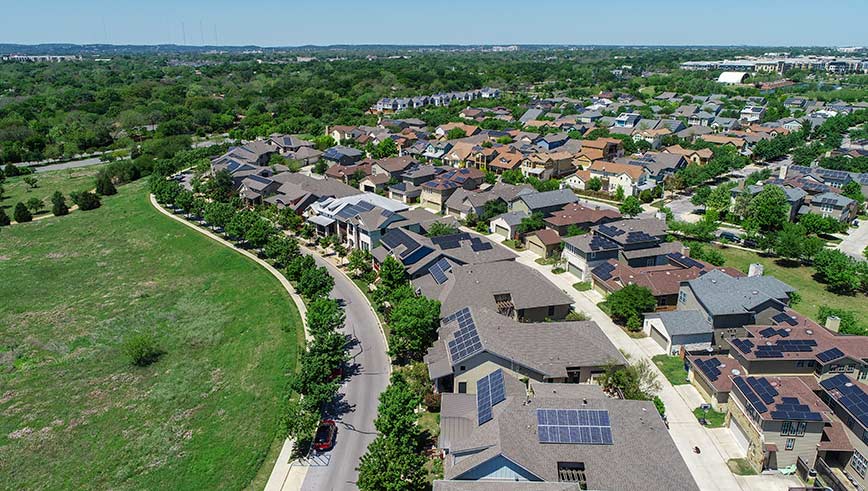
Victorian households will, from May 2027, be required to replace end-of-life gas hot water systems with heat pumps or other efficient alternatives under a range of new electrification regulations unveiled by the state Labor government on Tuesday.
The rule changes will also require all new homes and most commercial buildings to be built all-electric by January 2027, in a move the Allan Labor government says will cut home energy bills by $880 a year, or $1,820 if they have solar.
The new home electrification rules, which build on the Victorian Labor government’s Gas Substitution Roadmap, were unveiled on Tuesday as part of a Gas Security Statement, setting out a range of measures to avoid potential gas supply shortfalls as coal exits the grid.
The measures, which pull a mix of supply and demand levers, have disappointed somewhat on the demand side of the equation, falling short of placing a blanket ban on replacement gas heaters in existing homes, alongside gas hot water.
Legislation requiring existing gas heaters and hot water systems to be replaced with efficient electric alternatives at end-of-life was pitched as the government’s favoured approach in a Regulatory Impact Statement (RIS) published in December 2024.
It now seems that a more gently gently approach will be taken to phasing gas out of existing homes – an outcome that may or may not have been influenced by vocal campaigns by opposition and industry lobby groups that were well supported in some parts of the mainstream media.
In a statement on Tuesday, the Allan government says electric hot water systems are “often cheaper” up front than gas systems, with rebates available from the newly boosted Victorian Energy Upgrades scheme as well as Solar Victoria programs of up to $1,400.
Solar Victoria recently boosted its rebates for electric hot water systems, adding an extra $400 to the total subsidy if the system purchased is made in Australia.
But the new rules do make a welcome exception for rental homes, where both gas hot water systems and gas heaters must be replaced with efficient electric alternatives at end of life.
For rental properties and public housing, the changes mean that from 1 March 2027, new Minimum Energy Efficiency Standards will apply, including a ban on replacement gas heaters or hot water systems from that time.
The government says replacing end-of-life gas heaters with reverse-cycle air conditioners will save rental households up to $215 every year, while swapping out gas hot water systems with efficient heat pumps will save up to $220 a year.
On the energy efficiency front, minimum R5.0 rating ceiling insulation must be installed at the start of a new lease where there is no ceiling insulation already in place – saving a potential $450 every year.
Draught sealing, including weather seals on all external doors, windows and wall vents must also be installed at the start of a new lease, adding further potential energy bill savings of more than $110 a year.
The government says the electrification and efficiency reforms will deliver major reductions in gas demand at a time when supply pressures are driving up prices for industrial users and raising concerns of market shortfalls.
“Families will pay less on their energy bills, industry will get the gas it needs – and Victorian jobs are protected,” Victorian premier Jacinta Allan said on Tuesday.
“It’s good for industry, workers, renters and families – we’re on their side.”
The government says the rule changes – added to the existing ban on most new-build homes connecting to the gas network – will unlock just under 12 petajoules (PJ) of gas every year by 2029; more than the annual output of Beach Energy’s Enterprise field, which was approved for production last year by the Labor government.
Green groups have been quick to point out, however, that the gas demand reduction numbers could be much bigger, if gas heating was included in the new phase-out rule for all homes – not to mention the potential energy bill savings to consumers.
A 2024 report from IEEFA calculated that an average household would save about $1,200 each year if it replaced its gas appliances with efficient electric alternatives at the end of their life.
“Electrifying space heating is a huge opportunity for cutting bills and freeing up gas for industry,” said Energy Efficiency Council (EEC) chief Luke Menzel on Tuesday.
“Every Victorian with a gas bill landing on their kitchen table this winter knows how crazy gas prices have been getting. We can’t afford not to electrify our space heating in this state.”
The EEC on Monday released new analysis that showed phasing all gas appliances out of Victorian homes could free up an average of 72 petajoules (PJ) a year through to 2035.
The same analysis shows that electrifying space heating in Victorian homes could save an average of 31 PJ per year between now and 2035.
“While it is disappointing, this outcome means electrifying space heating rockets to the top of the list for the next tranche of reforms the Energy Efficiency Council will be calling on the Victorian government to deliver,” Menzel says.
IEEFA’s Jay Gordon says that while the new regulations only apply to hot water systems for many residences, households can still take advantage of various state incentives, including the newly boosted Victorian Energy Upgrades (VEU) scheme get off gas heating.
“The Victorian government recently introduced some of the strongest rebates in the country for efficient electric appliances, and these are growing in popularity – with thousands of gas heaters being replaced each month,” Gordon said on Tuesday.
“Homes that go the whole hog and replace all of their gas appliances could even disconnect from the gas network entirely, saving hundreds of dollars per year in fixed charges.”
And Gordon says the Allan government’s changes to minimum energy efficiency standards for rental properties, including the new rules on replacing gas appliances, puts Victoria “ahead of the pack.”
“One third of Victorians rent their homes, but are often stuck with poor-performing appliances and high energy bills,” Gordon says. “Improving minimum standards is one of the only solutions to address this inequity.”
“We love that the nearly one third of homes occupied by renters are prioritised, meaning that some of the most vulnerable households will see an early benefit in shifting away from expensive gas to more efficient hot water, heating and cooling options,” said Friends of the Earth No More Gas campaigner Freja Leonard.
“In a great many ways these are groundbreaking reforms for the climate and selected household budgets.”
The new rules for getting off gas
Under new regulations from 1 March 2027, when a gas hot water system reaches the end of its life, it must be replaced with an efficient electric alternative like a heat pump.
Existing gas hot water systems can still be repaired if they break down, the rule only applies at a system’s end of life. Gas systems can also be temporarily removed and reinstalled during renovations.
There are no changes to heating for owner occupiers.
There are no changes to gas cooking in existing homes.
From January 1, 2027, all new homes will be built all electric. All new commercial buildings (other than industrial, manufacturing and agricultural buildings) will also be required to be built all electric.
There are no changes to rules regarding end-of-life replacement for gas appliances in all existing commercial buildings. The use of LPG for households or business is also unchanged.
What the government says
“To make sure Victoria’s appliance manufacturing industry is ready to meet the demand for energy efficient hot water appliances, we’re investing $9.5 million towards an Industry Diversification Program,” a statement said on Tuesday.
“This will support existing businesses to ride the wave of the expansion of electric appliance manufacturing and help the gas appliance manufacturing supply chain upgrade their facilities and reskill their workforce.
“Every single upgrade a property may need under the new minimum efficiency standards is eligible for a discount under our Victorian Energy Upgrades program. Exemptions also apply, including if installation costs are too high or if there is not enough space.”
“We’ve also rolled out of the SEC’s Home Electric Planner where Victorians can access trusted and easy to understand information on installing electric appliances – it calculates all the upfront costs, annual bill savings, return on investment and applies government discounts and rebates.
To see what rebates and discounts are available visit, energy.vic.gov.au/households/save-with-all-electric-home or to use the SEC planner visit, powerup.secvictoria.com.au.







